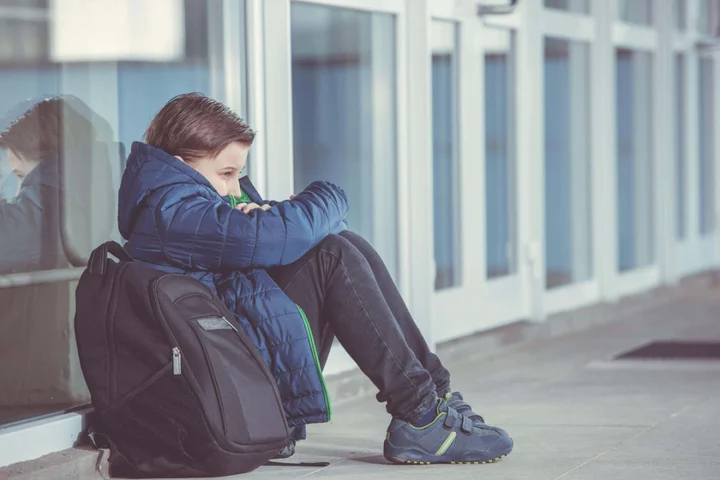
This is why you have weird dreams in the heatwave
Everyone has a theory about their dreams and the science or meaning behind them. And when the weather hots up, the more bizarre they tend to get. “Dreams are a fascinating and enigmatic phenomenon that occur during sleep, encompassing a vast realm of imaginative experiences,” says sleep expert and CEO of MattressNextDay, Martin Seeley. “They are a collection of thoughts, images, sensations, and emotions that unfold within the theatre of our minds.” Why do we dream? When we sleep, our brain enters a complex state where it engages in various cognitive processes, explains Seeley, including memory consolidation, problem-solving and emotional regulation. “Dreams are thought to emerge from these processes, weaving together fragments of memories, desires, fears, and subconscious thoughts into a narrative or non-linear sequence,” adds Seeley. “And they can be surreal, vivid, or mundane, blurring the boundaries between reality and fantasy.” While the precise purpose and meaning of dreams remains a subject of exploration and debate, Seeley says they can serve as a portal into the inner workings of our minds: “Providing a canvas for exploration, processing of emotions, and glimpses into the subconscious depths of our psyche.” Why do we dream more when it’s hot? Lisa Artis, deputy CEO of The Sleep Charity, says: “When the weather is hot, it can disrupt our sleeping patterns, making it difficult to fall asleep in the first place – and causes us to wake more often during the REM (rapid eye movement) sleep phase.” REM sleep is where we experience intense dreaming, explains Artis – so waking during or at the end of this cycle can mean we are more likely to remember our dreams. “Dreams happen regularly, but are often forgotten and our mind’s way of unpacking the day’s events, dealing with stress and sorting through our day-to-day thoughts,” notes Artis. Our body heat generally peaks in the afternoon then starts to drop over an evening to prepare us for sleep, says Artis. Melatonin, the sleep hormone, is produced when this happens.“An ideal temperature is around 16-18°C and anything around the 24°C mark can cause restlessness,” says Artis. “So, it’s no surprise that when we’re experiencing a heatwave with temperatures reaching over 30°C, it affects our sleep.”Can a heatwave really make dreams more surreal? The connection between heatwaves and the content or nature of dreams is not fully understood. However, there may be a few possible explanations if your dreams seem weirder when the weather heats up – although Seeley points out these are all speculative. First off, he agrees it may have a lot to do with the fact we’re less comfortable and waking more when it’s hot. “These frequent awakenings can interrupt the normal sleep cycle and result in a higher probability of remembering dreams, including the more unusual or vivid ones,” he notes. “So, during a heatwave, the increased frequency of waking up during the night might contribute to a greater recall of strange or funky dreams.” Secondly, the body’s physiological response to heat may influence brain activity, he adds: “Heat can affect neurotransmitter levels, such as serotonin and dopamine, which play a role in regulating mood and emotions. These alterations in neurotransmitter activity might impact the content and emotional tone of dreams, potentially leading to more surreal or bizarre experiences.” Psychological factors could also play a role. Heatwaves can cause restlessness and increased stress levels in some individuals. Seeley adds: “Stress and emotional fluctuations can manifest in dreams as strange or unusual scenarios, as the mind processes and attempts to make sense of these experiences.” Can we stop strange heatwave dreams happening? While it’s probably not possible to completely control the content of our dreams, there are certain strategies you can try to promote better sleep – and potentially reduce the likelihood of experiencing a restless night and unusual dreams during hot weather. Create a cool sleep environment: “Use fans, air conditioning, or open windows to circulate cool air in your bedroom – and consider using lightweight, breathable bedding materials,” says Seeley. Stay hydrated: “Drink enough water throughout the day to prevent dehydration, especially during hot weather,” he continues. “Being adequately hydrated can help maintain a balanced sleep cycle.” Practice relaxation techniques: “Engage in activities that promote relaxation before bed, such as deep breathing exercises, meditation, or taking a warm bath,” suggests Seeley. “These practices can help calm your mind and promote a more restful sleep.” Read More Charity boss speaks out over ‘traumatic’ encounter with royal aide Ukraine war’s heaviest fight rages in east - follow live All the times Kate has channelled the late Queen’s style since her death It’s not just dry skin: 5 things everyone needs to know about eczema YouTube begins verifying videos by UK doctors to tackle health misinformation
2023-09-08 17:49

World food price index back at two-year low despite rice surge -FAO
PARIS (Reuters) -The United Nations food agency's world price index fell in August to a new two-year low, reversing a
2023-09-08 16:49

YouTube begins verifying videos by UK doctors to tackle health misinformation
YouTube has launched a verification system for UK-based doctors, nurses, and other healthcare professionals to help Britons dodge medical misinformation online. UK-based users accounted for more than two billion video views of clips on health conditions in 2021. YouTube added a new seal of approval to accounts run by licensed doctors, nurses, psychologists, and other health practitioners or organisations who have passed stringent verification checks to fight misinformation. YouTube head of UK health Dr Vishaal Virani said the move to verified health videos for UK users was crucial due to the number of Brits accessing healthcare information through the video-sharing platform. Dr Virani told the BBC: “Whether we like it or not, whether we want it or not, whether the health industry is pushing for it or not, people are accessing health information online. We all know how difficult it can be to differentiate between healthcare information from trusted and reliable sources and content which is inaccurate or doubtful provenance Professor Dame Helen Stokes-Lampard “We need to do as good a job as possible to bring rigour to the content that they are subsequently consuming when they do start their care journey online.” The verification system began accepting applications from UK-based healthcare professionals to those with an active medical licence in June. Accounts that applied to the verification scheme are now starting to receive their YouTube mark of authenticity on their videos, to make it as easy as possible users to know if the information has come from a qualified healthcare professional. Potential health creators submitting their accounts have to go through a rigorous, multi-stepped verification process that works in partnership with the Academy of Medical Royal Colleges and the NHS. Health creators also have their past videos scrutinised and do not receive verification if previous videos uploaded to YouTube have contained any medical misinformation. Chairwoman of the Academy of Medical Royal Colleges Professor Dame Helen Stokes-Lampard said the partnership with YouTube had resulted in a positive solution for all. Dame Helen said in a statement: “We all know how difficult it can be to differentiate between healthcare information from trusted and reliable sources and content which is inaccurate or doubtful provenance. “I am pleased to say we have been able to draw on our own expertise and that of organisations from across the UK healthcare landscape to produce an easy-to-apply set of principles which will ultimately benefit everyone who turns to YouTube seeking trustworthy health information.” YouTuber and doctor Simi Adedeji has already received her YouTube tick of approval. But Dr Adedeji told the BBC that her videos, which primarily focus on skin health and women’s health, are not to be used in lieu of making an appointment with a medical professional for real-life advice. Dr Adedeji said: “There’s a difference between giving medical education, which is what we’re doing, and giving medical advice, which we don’t do. “It’s about giving medical information so that the audience feels empowered and can then go and see their doctor.” Read More Charity boss speaks out over ‘traumatic’ encounter with royal aide Ukraine war’s heaviest fight rages in east - follow live Should you swap your foundation for a lightweight skin tint? What should you do if you think your child is being bullied at school? What women should do if they experience violence online
2023-09-08 16:25

It’s not just dry skin: 5 things everyone needs to know about eczema
It’s easy to dismiss eczema as just itchy dry skin. But as millions of people know, the effects of eczema go way beyond this. “Eczema is so much more than ‘just an itch’,” says Andrew Proctor, chief executive of the National Eczema Society. “Affecting over eight million people in the UK, this incurable, highly visible skin condition has a huge impact on every aspect of a person’s life, extending far beyond the physical symptoms of itchy, inflamed, sore, cracked and bleeding skin. “Living with eczema means constantly having to plan and prepare, as every decision you make will potentially affect your skin. It shapes your home environment, education, career, social life, hobbies, holidays and relationships, and as a result, patients often report feeling anxious, depressed, self-conscious, isolated and helpless.” This National Eczema Week (September 9-16), here’s what Proctor wants everyone to know… 1. It doesn’t just affect children Atopic eczema affects one in five children and one in 10 adults in the UK. Proctor says: “While eczema is often viewed as a childhood condition, it affects people of all ages. Some develop eczema as babies, others in childhood, but thankfully it can improve over time.” Some people will have eczema all their life however, and some only develop it in their later years. “The important thing is to seek medical advice as soon as possible to get control of the eczema and develop an effective skincare routine,” advises Proctor. 2. It’s not contagious Proctor says that sadly, many people still think you can catch eczema. “However, atopic eczema isn’t contagious,” he stresses – pointing out it’s a complex condition involving genes, the immune system, the environment and our skin barrier. “This means skin becomes very dry and doesn’t provide sufficient protection from irritants, allergens and infection.” To tackle this, a foundation of eczema care is to apply medical moisturisers (emollients) to trap water in the skin and help reinforce the skin barrier. “Finding the emollient that suits your skin best can involve a lot of trial and error, but it’s critical to managing eczema,” says Proctor. 3. Environment plays a huge role Environmental factors can trigger eczema flare-ups or make it worse. Common culprits include stress, being too hot/cold or experiencing a sudden change in temperature, soap, shampoo and bubble bath, laundry detergent and cleaning products, perfume, pollens and moulds, pet fur, wool and synthetic fabric, and house dust mites. “Everyone will have certain things that trigger their eczema, and these vary between people,” Proctor explains. “Try keeping a diary to help identify triggers and patterns, so you can remove likely suspects and see if it helps. Triggers can also change over time and it’s worth continuing with the diary even if you think you’ve identified yours.” 4. It’s hard not to scratch Proctor explains: “One of the most maddening things you can say to someone with eczema is ‘stop scratching’. It’s not that simple! The unbearable, relentless itch is one of the defining features of the condition, and patients refer to it as torture. “You know you shouldn’t scratch, as it damages the skin and can cause infections, but the relief it provides is irresistible.” To help manage the itch, Proctor suggests finding a positive distraction or asking others to help you take your mind off it. You could also try substituting another action for scratching – press a nail on the itchy patch or tap the skin gently with your forefinger; keep your hands occupied with a ball, toy or other object; or wrap a bag of frozen peas in a towel and apply it to the itchiest area. 5. It’s a mental as well as physical battle Living with eczema is mentally exhausting too. “It can be a rollercoaster of emotions, from excitement when you start a new treatment, to despair when it doesn’t work or you experience a bad flare-up,” says Proctor. “There can be huge frustration too, when you do everything you’ve been asked and the eczema still refuses to give you any respite.” If this happens, as well as asking your GP or dermatologist for a review, it’s important to reach out to family and friends for support: “People who are able to open up about how their eczema truly affects them can feel a huge weight has been lifted.” Other ways to help cope include good nutrition and hydration, regular exercise, rest and relaxation. “Journaling, meditation and mindfulness can help you focus on the good things in your life and counterbalance negative feelings about eczema,” adds Proctor. “When so much time and effort goes into managing your eczema, it’s easy to forget there’s more to you than just your skin. Think about what you want to accomplish and formulate a plan. It’s about living successfully alongside eczema, not having your life defined by it.” For more information, visit eczema.org. The NES’ new video – More Than ‘Just An Itch’ – goes live on September 9 to mark National Eczema Week. Read More Charity boss speaks out over ‘traumatic’ encounter with royal aide Ukraine war’s heaviest fight rages in east - follow live YouTube begins verifying videos by UK doctors to tackle health misinformation Should you swap your foundation for a lightweight skin tint? What should you do if you think your child is being bullied at school?
2023-09-08 16:20

Pinault to Buy Majority Stake in Talent Agent CAA
French billionaire Francois Pinault’s holding company Artémis agreed to buy a majority stake in the Hollywood talent giant
2023-09-08 15:26

What should you do if you think your child is being bullied at school?
As well as being exciting, the start of a new school year can be very scary for some kids – as the toxic dynamic between bullies and the children they target could resume. The prospect of a new year of bullying, or the first experience of being a target for school bullies, can blight the lives of pupils and become something that terrifies both them and their parents, who are often unaware of the persecution of their child. Indeed, new research by the anti-bullying charity The Diana Award for its #BacktoBullying campaign has revealed 65% of children are scared of going back to school, with a third saying the thought of returning to school makes them want to cry. And it’s not just the kids who are scared – the study found half of parents dread sending their children back to school due to bullying. “When the new school year starts it can be an exciting and sometimes unsettling time for children,” points out Martha Evans, director of the Anti-Bullying Alliance (ABA). “There will be new pupils, new class groupings and, for some, new schools. It can be a worrying time and we’re often told friendships and bullying are high on the list of worries. “Parents should be aware of the signs that their child might be on the receiving end of bullying behaviour, and know how to respond.” Evans says research suggests being bullied can have serious implications for a child’s life chances, with the effects often lasting into adulthood. That’s why anti-bullying training and programmes for schools, including Anti-Bullying Week (November 13-17), are so vital for schools to help tackle the problem. Evans says it’s useful for parents who are concerned about bullying to understand exactly what bullying is, as “it’s not just ‘falling out’ or ‘banter’”. The ABA defines bullying as: “The repetitive, intentional hurting of one person or group by another person or group, where the relationship involves an imbalance of power. Bullying can be physical, verbal or psychological. It can happen face-to-face or online.” What are the signs of bullying? Children might not want to talk about what’s going on, but Evans says warning signs of bullying may include… Coming home with torn clothes or missing belongings. “This could show your child is being picked on physically,” says Evans. Unexpectedly not wanting to go to school. Evans points out that while most bullying starts face-to-face at school, it often then goes online, too. Complaining of unexplained illnesses or headaches. “The stress of bullying can create physical symptoms, or the child may make up illnesses to avoid being bullied at school,” warns Evans. Becoming quiet and withdrawn. Evans says worrying about hurtful behaviour can cause deep anxiety, and children may look upset when they use their electronic devices. “Online bullying is particularly hurtful,” explains Evans, “as it follows a child even after they’ve left the school gates and can continue 24/7.” Children who are being bullied may want to leave for school much earlier than necessary or come home late, says Evans. “Avoiding other children arriving or leaving school is a sure sign something is wrong,” she points out. What should you do if your child is being bullied? Stay calm Evans says it’s important to keep your cool, even though you’re probably feeling angry and upset that your child is being targeted. “You should focus on gently speaking to your child and listening carefully,” she explains. “Your job is to reassure them that it can be sorted out.” Get the facts Talk calmly to your child and establish what’s happened and who did what, and when. Evans advises parents and children to keep a diary of when the bullying happens, and explains: “It will be useful to see the pattern of bullying over time and to share with the school, if and when you speak to them.” Tell them not to retaliate Evans says parents shouldn’t encourage their child to retaliate to bullying, especially through violence, as it can have negative and unpredictable results. “They may be hurt even further, or be seen by those in authority as the problem,” she warns, and suggests instead that parents tell them to walk away and get help. Be aware of mental stress Don’t underestimate the effect bullying can have on a child’s mental health and keep an eye out for warning signs. “Bullying can have a considerable impact on a child’s mental health,” warns Evans, “so if your child is showing signs of serious distress, such as depression, anxiety and self-harm, always see a GP.” Find out what your child wants Parents should ask their child what they want to happen next, advises Evans, and help them to identify their choices, the potential next steps to take, and the skills they have to help stop the bullying. Speak to the school Ask to see the school’s anti-bullying policy, so both you and your child know the process for getting things sorted out, advises Evans. Don’t let them blame themselves Sometimes children can think they’re to blame in some way for being bullied, but Evans stresses: “Make it clear that bullying is never acceptable and if a child or young person is being bullied then it’s others who are to blame, not them.” Read More Charity boss speaks out over ‘traumatic’ encounter with royal aide Ukraine war’s heaviest fight rages in east - follow live What women should do if they experience violence online Athlete who ran over 200km through the desert shares advice for running in a heatwave Women being invited to help shape the future of reproductive healthcare – from period pain to menopause
2023-09-08 14:57

Rugby World Cup Presents France With a Real-Life Olympics Test
The Rugby World Cup kicks off Friday on the outskirts of Paris, with the first match pitting two
2023-09-08 12:46

Paqui voluntarily removing One Chip Challenge product from shelves
Tortilla chip brand Paqui says it is voluntarily removing its ultra-spicy "One Chip Challenge" from shelves after a Massachusetts family claims their 14-year-old son may have died from complications from the challenge.
2023-09-08 10:46

In a First, Asahi Is the Official Beer for the Rugby World Cup
Asahi Group Holdings Ltd. has become the first Japanese brewer to become an official sponsor of the Rugby
2023-09-08 10:15

Lotus Unleashes Emeya, a Porsche Panamera-Like Electric Sedan
The next electric-vehicle maker poised to merge with a blank-check company will go public with some product momentum
2023-09-08 08:56

UK Plans Food Security Summit After Black Sea Deal Collapse
The UK plans to host a summit for countries hit by rising food prices due to Russia’s war
2023-09-08 06:28

Elon Musk reveals names of his twins with Shivon Zilis
Elon Musk has revealed the names of the twin children he shares with Shivon Zilis. In an excerpt of Musk’s upcoming biography, published by Time Magazine, author Walter Isaacson wrote that the Tesla CEO, 52, and the Neuralink executive, 37, named their 16-month-old twins, Strider and Azure. On X, formerly known as Twitter, the author also shared the first photo of the family together, with Strider seen pictured sitting on his mother’s lap while Azure was perched on her father’s. Musk and Zilis reportedly welcomed twins Strider and Azure in November 2021, but the news didn’t make headlines until July of the following year. According to Isaacson, although Zilis has been Musk’s “intellectual companion on artificial intelligence since the founding of OpenAI eight years earlier” and shares children with the X owner, the duo are not in a romantic relationship. Reuters reported that Zilis had allegedly confided in colleagues that the twins were conceived via in-vitro fertilisation. Earlier in 2021, Musk also welcomed a baby girl named Exa Dark Sideræl, who goes by Y, with ex-girlfriend Grimes. The couple secretly welcomed the child via surrogate. The “Oblivion” artist and Musk also share a three-year-old son, X AE A-XII, whom they welcomed in May 2020. X’s initial name, X AE A-12, did not follow California guidelines so the couple was forced to comply and made the change. According to Page Six, after three years together, the pair reportedly “semi-separated” in September 2021 before Exa’s arrival. In addition to the children he shares with Zilis and Grimes, Musk also fathered 19-year-old twins Vivian Jenna Wilson and Griffin, along with triplets Kai, Damian, and Sax, with his first wife, Justine Wilson. The triplets were born in 2006, while the twins were born in 2004. According to court documents obtained by TMZ, Vivian, who is transgender, publicly disavowed her father in a petition that asked for a new birth certificate to be issued by the state. In the documents, she wrote that the reason behind her name change was not only her new “gender identity” but also because of “the fact that [she] no longer lives with or wish to be related to [her] biological father [Elon] in any way, shape or form”. According to Musk’s biographer, the tech entrepreneur “was generally sanguine” about his daughter’s transition, but political ideology is what ultimately divided them. "I’ve made many overtures," Musk told Isaacson about his alleged atempts to mend his relationship with his daughter. "But she doesn’t want to spend time with me." Read More First photo emerges of Elon Musk and his baby twins with Neuralink director Elon Musk thwarted Ukrainian drone attack on Russian ships, book claims
2023-09-08 04:25
